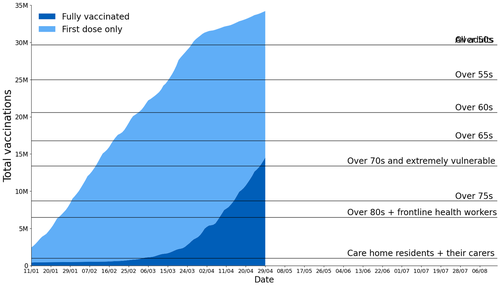The Health Ministry has identified 41 new cases of the Indian coronavirus variant in Israel, including four in people who have been vaccinated against COVID-19.
Israel's genomic sequencing system found that 24 of those infected with the variant, which experts say may be more contagious than other variants, had returned recently from abroad. The other 17 contracted it via community transmission, including five schoolchildren. The Health Ministry and the IDF Home Front Command are carrying out widespread testing at the schools where the children are enrolled.
Twenty-one of the people who tested positive for the variant are foreign nationals. Last week, Israel banned entry to tourists from India over concerns about the variant's spread and the severe increase in cases there. As part of the new restrictions, only 300 Indian caregivers and students will be allowed to enter the country per month. They will be required to quarantine at coronavirus hotels designated for those coming from India, unless they have either recovered from or were vaccinated against COVID-19 in Israel.
A Health Ministry statement said that new restrictions which would forbid Israelis from traveling to countries with high infection rates (save for exceptional cases) are awaiting approval from the relevant ministries before it can be sent to government approval. Israelis returning from these countries would also need to quarantine, even if they have been vaccinated against or recovered from COVID-19. Foreign nationals from these countries would also not be allowed to enter Israel, and those who have received permission to do so would have to quarantine at designated hotels, as is the case with arrivals from India.
Last month some 1,000 people entered Israel from India, and only about a quarter of them were vaccinated. Among those who entered, 63 tested positive for the virus, but not all of them had necessarily been infected by the Indian variant.
The Indian variant is of concern to experts because it consist of two mutations of its protein, which could make it more resistant to the coronavirus vaccine. Last month, the Indian Health Ministry reported on a strain of the virus that includes two genetic changes and constitutes a kind of “union” of two variants previously known as E484Q and L452R.
However, because samples collected from throughout India have shown that the most dominant variant in the country is the British variant, the prevailing view is that the new strain of the virus is not behind the latest outbreak in India, which is rapidly spreading across the country.
The Israeli Health Ministry also identified eight new cases of the South African variant, seven of the New York variant, two of the California variant, one of the St. Petersburg variant and one case of an additional British variant.
Although most of the coronavirus restrictions in Israel have been rolled back in recent weeks due to the drop in infections, entrance to the country is still being controlled. Israelis who enter without a vaccination certificate must quarantine at home, while those who recovered or were vaccinated in Israel do not have to quarantine, but must receive a negative result from the rapid coronavirus test now being administered to everyone entering Israel via Ben-Gurion Airport.
